Style snapshots at the Venice Biennale
June 2, 2017Ah, Venice. What’s better than to be in Venice on an early summer day, sweeping down the turquoise Grand Canal on a boat, as the elegant 16th century palazzos in their colours of sienna, burnt umber and terracotta totter over the water? Well, better than that is to be there in possession of a press pass allowing access to the Venice Biennale before it opens to the public, to see the pavilions freshly installed with artworks that will be visited by thousands in the next month.
Venice Biennale
However, some people aren’t even content with that. No, we turned up a day early, intent on seeing everything and everybody immediately. You see, the first four days of the Biennials are reserved for the VIPs, the celebrities of the art world – the galleries, the curators, the buyers who come on their yachts to go shopping.
Now, I don’t have a yacht and my shopping budget is entirely reserved for clothes, so a certain amount of subterfuge was necessary. My partner in crime obtained a map and made an arrangement: “Arrive at the Biennale gardens. Keep walking. Go past it, go over a bridge, dodge here and there. You will see a row of doors. On one will be a small cross. Wait outside and ring this number. You will be admitted.” The door was the back gate to a certain country’s pavilion, and we were in with the glitzy and the glamorous.
Venice Biennale style snapshots
If you haven’t been to the Venice Biennale for art, or haven’t heard of it, it’s like a high culture Eurovision, although regrettably largely far more serious. Many countries have their own pavilion in Venice’s public gardens, the Giardino delle Vergini. These are permanent structures, each the size of a council house, built-in different architectural styles. Some are grand and neo-classical, some look whimsical, with onion domes and iridescent roof tiles. Others are of brutalist concrete. The British pavilion, which this year features Phyllida Barlow, goes for balconies and colonnades. Countries which have no pavilion of their own may be invited to stake a patch in the larger buildings of the Arsenale or the Giardino, where Venice’s overall curator, this year Christine Macel, has created a grand experience. Macel’s theme for the year was “VIVA ARTE VIVA”.
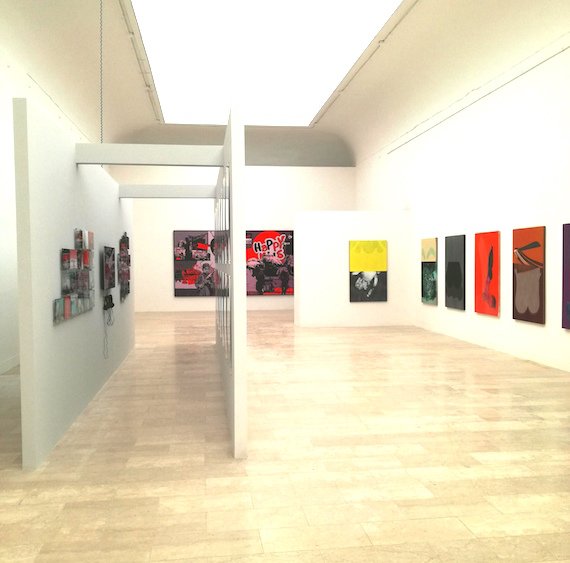
Inside the Serbian Pavilion.
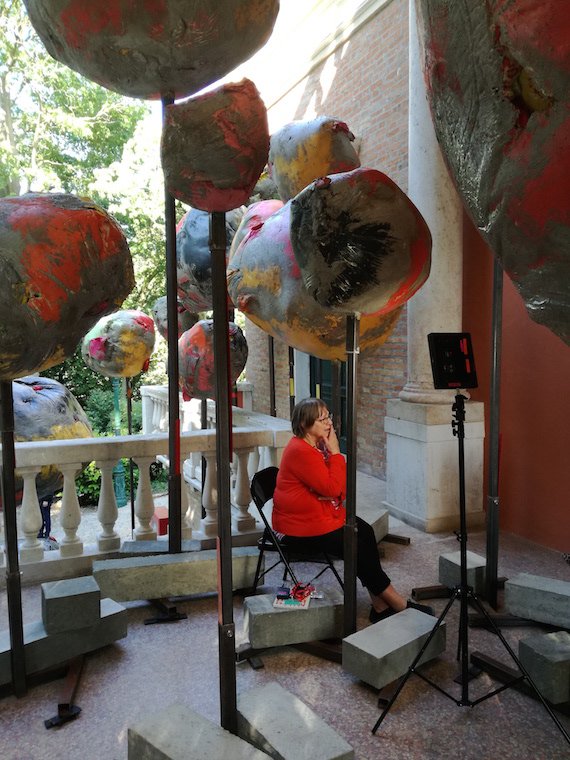
Artist Phyllida Barlow sits amongst her artworks outside the British Pavilion.
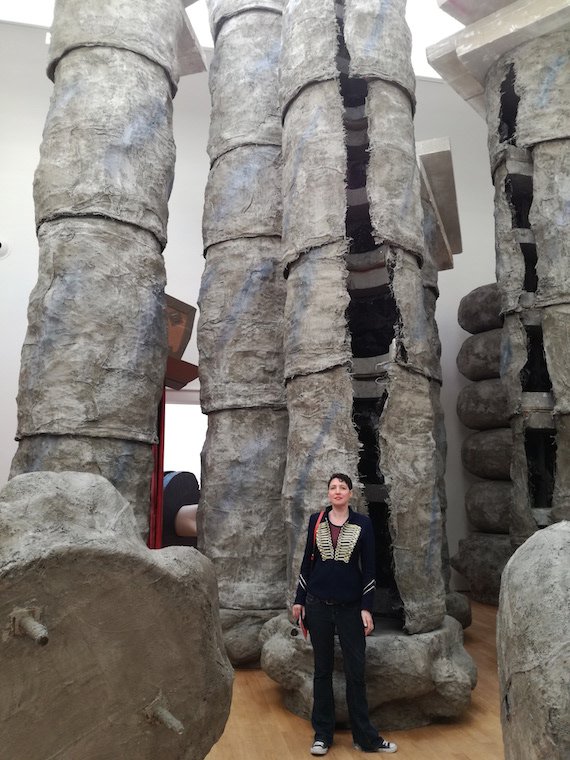
Phyllida Barlow’s crumbling pillars of the Empire are massive.
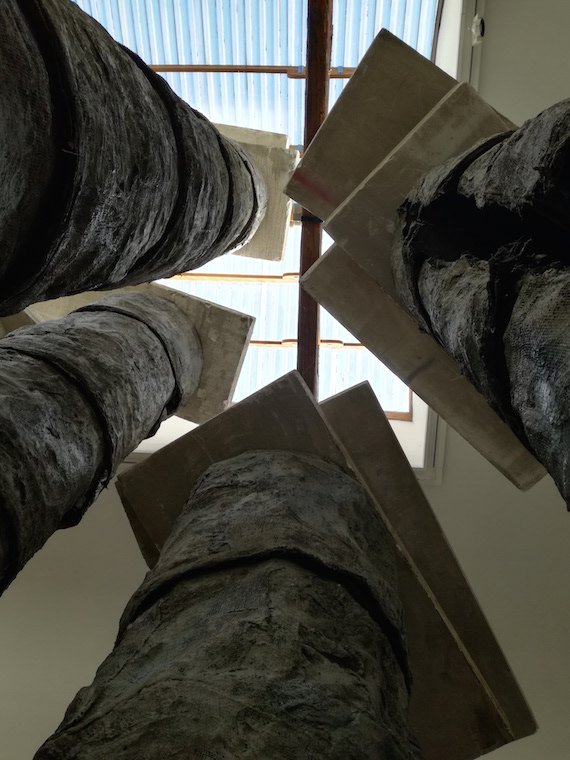
Phyllida Barlow’s work threaten to burst through the roof.
Venice Biennale art space
The wonderful thing for me in the Venice Biennale is the way that the art can inhabit the space. The pavilions are strange little mini gallery Wendy houses, and while some take them seriously and hang paintings neatly on white-painted walls (and the best example of this was the Serbian Pavillion, newly renovated and beautifully lit), others, like Britain and America, stuff the structures to the gills with sculpture that clings to the ceiling like a giant wasp’s nest in the case of the USA, (Mark Bradford) or threatens to bash right through in the case of the UK.
The Canadian pavilion was literally smashed in, and a jet of water sprang up through its ruins like a giant bust water main, and in Italy, you climb a set of stairs to find yourself somehow staring at the ceiling of its pavilion – reflected, it turns out, in a perfect undisturbed pool of water.
A magnificent setting
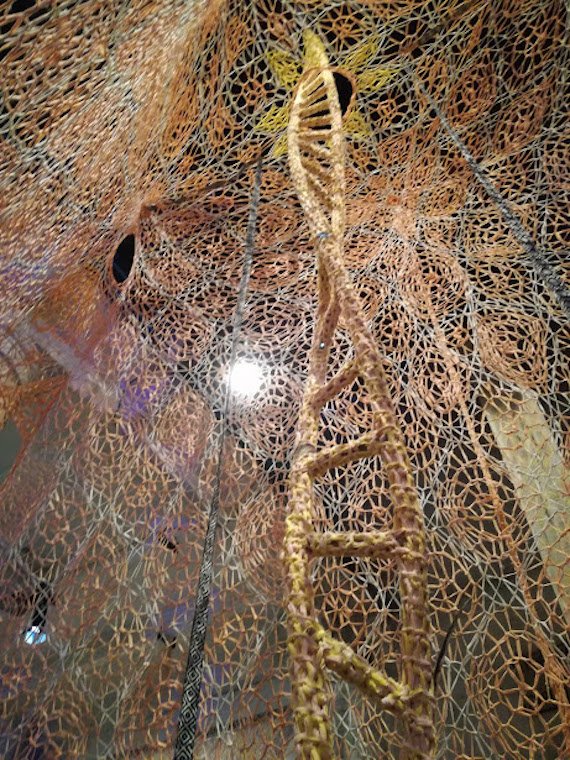
Ernesto Neto.
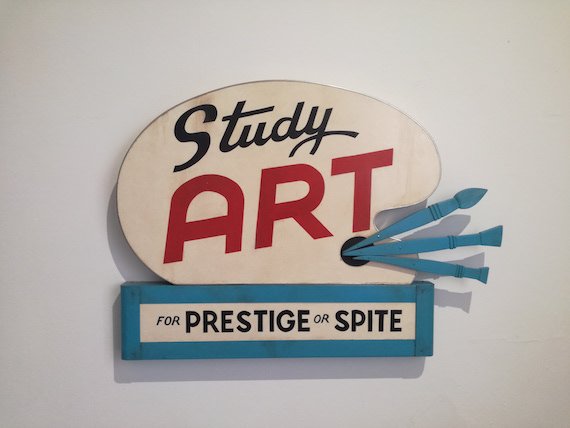
“Study Art” by John Waters
If visiting the Pavilions isn’t enough, Christine Macel’s huge curated exhibition is held in the warehouse buildings of an historical shipyard with exposed brickwork and beams, and it’s the way that artwork contrasts or interacts with these old buildings that makes the Venice Biennale unique. Macel invited these artists and often worked with them directly too, so although the countries, subjects and media are diverse, wandering through the long building each artwork gives onto the next harmoniously enough. There are famous artists here this year alongside less well-known ones: Ernesto Neto weaves his nets into tents with a theme of supporting indigenous Brazilian tribes; Olafur Eliasson’s Green Light project is constructed live by refugees as you watch. And is that John Waters, film director’s aluminium “Study Art – for prestige or spite” signs or the work of another John Waters?
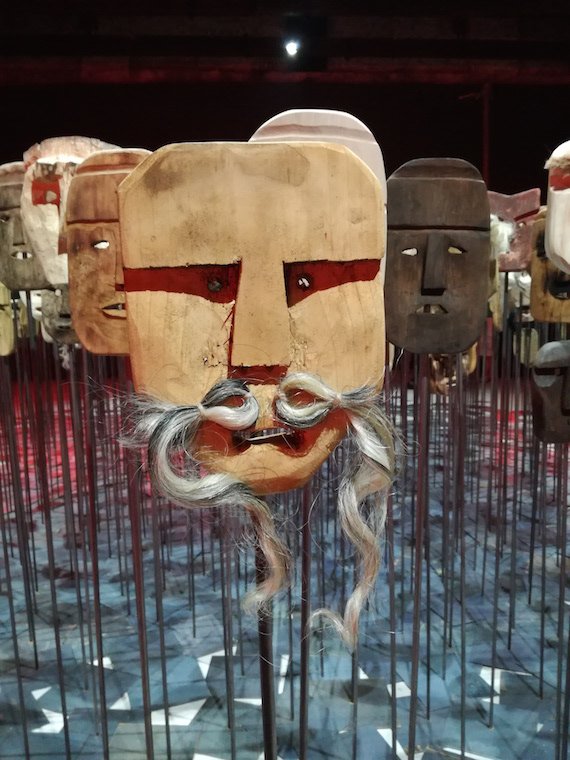
Chilean Mapahuche Mask.

Chilean Masks
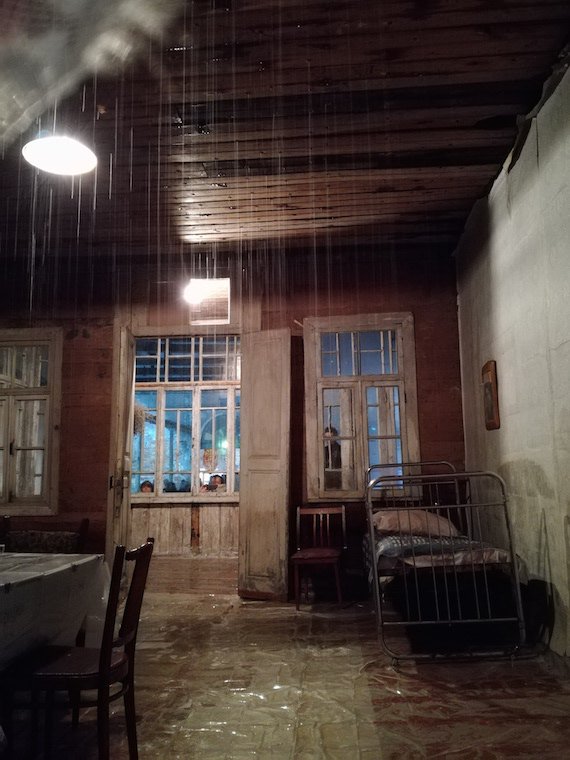
Georgian Pavilion
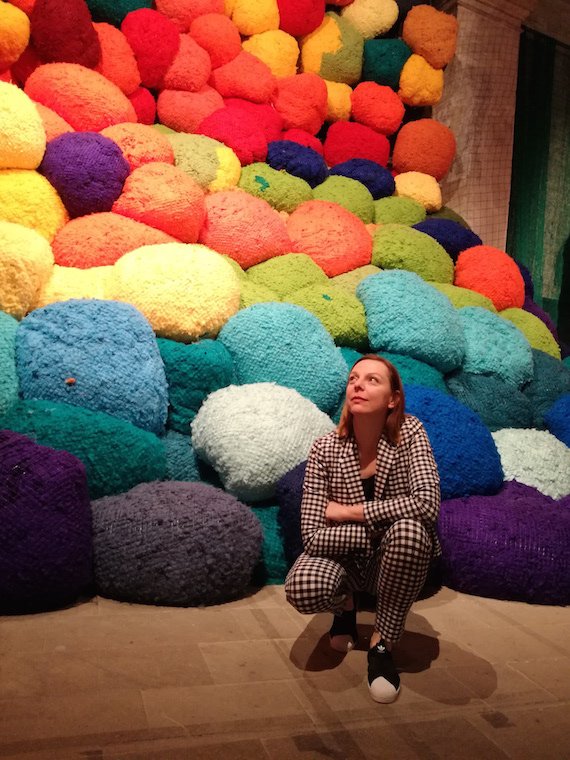
Alexandra Lazar in front of Sheila Hicks’ work.
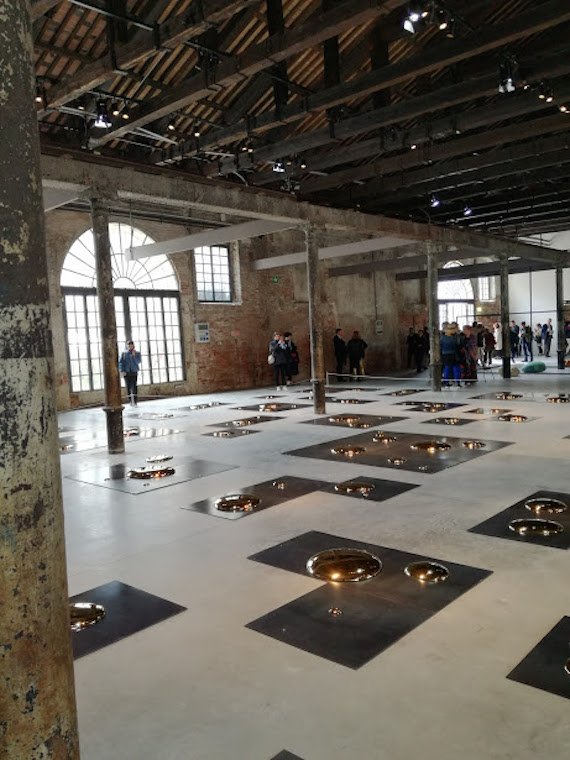
Inside the Venice Biennale
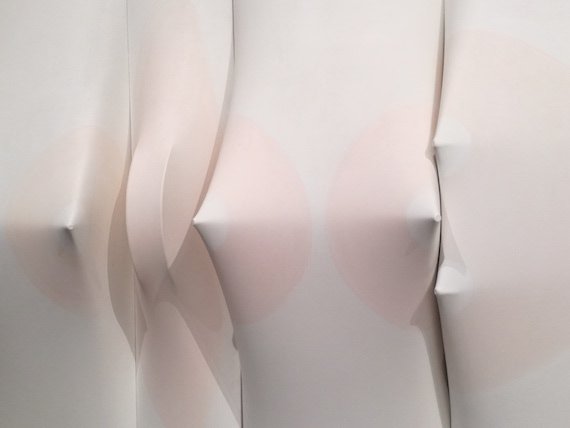
A work by Zilia Sanchez
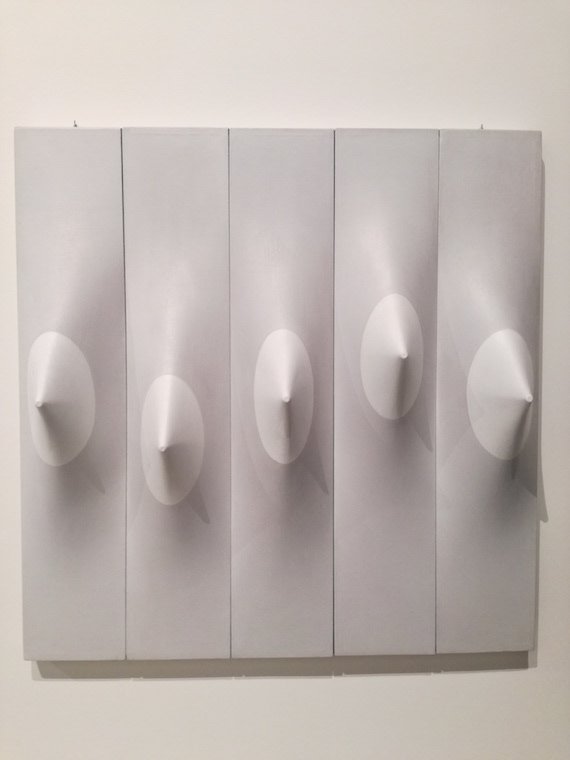
The Amazons.
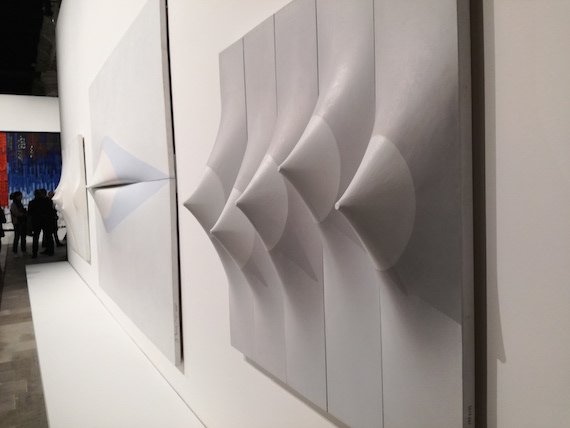
The Amazons
Venice Biennale artists
Some artists I didn’t know but would like to: Chilean artist Bernardo Oyarzún spotlit 1,500 Mapuche masks in a dark room – it was fun to find your favourite character. Georgian artist Vajiko Chachkhiani built a full-sized two room shack, which rained and rained upon the sparse possessions inside. Peering in through the windows was a sadness and fascination combined.
Sheila Hicks terminated a long stretch of wandering through the Arsenale with glorious bales of bright colour heaped against a wall and more somber and formal was a setup of flawless mirrors and mercury-like blobs on black and white floor tiles – it was like a riotous wildflower garden followed by a formal knot garden – both beautiful in different ways. Zilia Sanchez made canvases with tented protrusions that delightfully mimicked body parts – I particularly liked one entitled “The Amazons”, which looked like a row of women lined up, bare breasts at different heights.
Ancient buildings
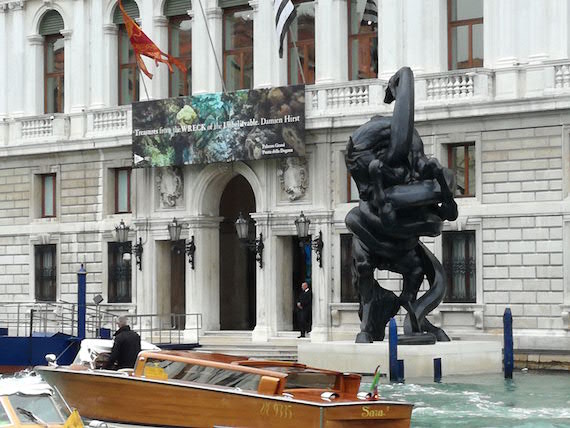
Outside of Damien Hirst’s extravaganza.
There are also plenty of shows outside of the official ones. Just as London Fashion Week spawns fringe shows, so palazzos all over Venice are hosting exhibitions big and small. One I was most disappointed not to see was Damien Hirsts’ “Treasures From the Wreck of the Unbelievable”. It’s not that I think that Damien Hirst is the best thing since sliced bread, but I grew up with him and his art, and this show might be his biggest yet – it took his army of assistants six years to make, stretches over two huge sites in Venice and is a tongue in cheek display of “rescued art treasures”, all actually fabricated in Hirst’s London studios.
The other show I was too early to view was Axel Vervoordt and Daniela Ferretti’s “Proportio”, situated in the Fortuny Palazzo. Mariano Fortuny might be Venice’s most famous dress designer to date, though his peak was about 1915. His pleated silk dresses are still sought after, and his palazzo is lovely. Vervoordt always curates a delicate show in amongst the carefully preserved remains of Fortuny’s own studio.
Venice Biennale – The fashion!
Even so, we saw vast amounts of art, and still must go back to see gallons more. But enough about the art, what do people wear to look at it? Well, it varies from the outrageous to the practical. Curators of course wear black, and artists veer toward jeans. Unless the artists are artworks in their own right, them they are fabulous, like Eva and Adele:
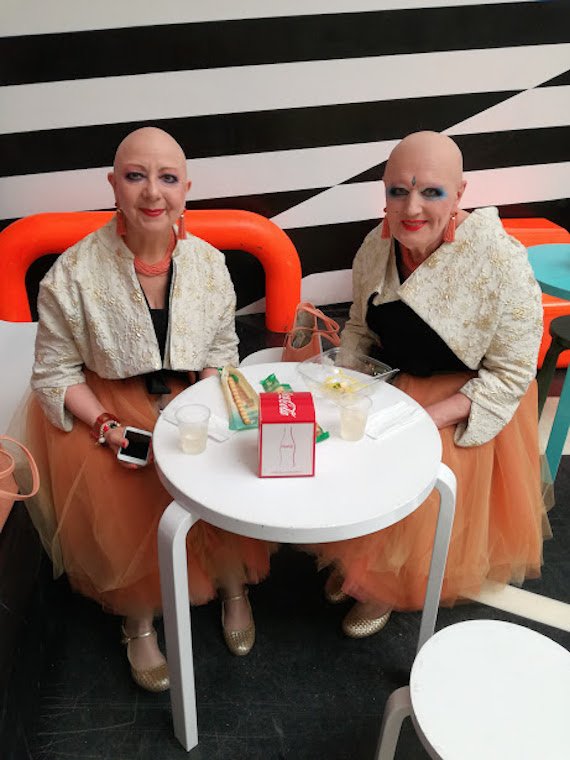
Eva and Adele – photo by Genevieve Jones and Eva and Adele.
Phyllida Barlow (on the right, with Drina Gallery’s artistic director Alexandra Lazar on the left) chose colours to complement her artwork,
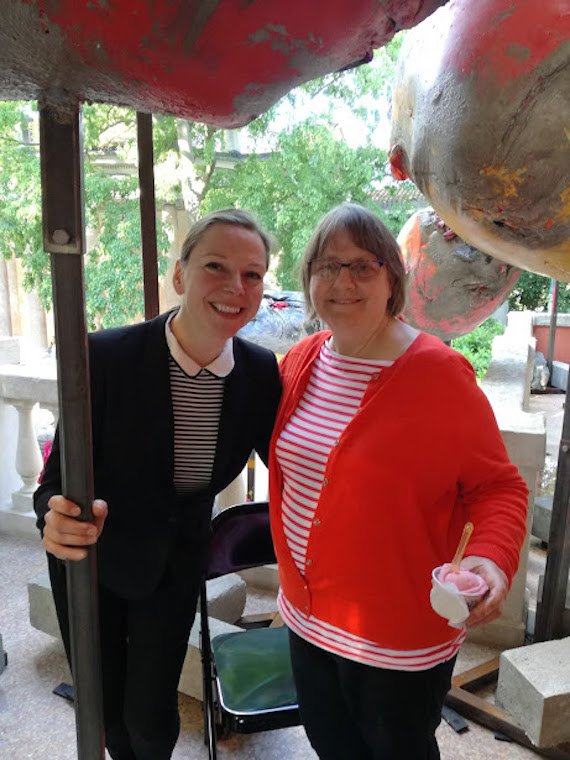
Alexa Lazar and Phyllida Barlow outside Great Britain’s Pavilion at the Venice Biennale
And, not an artist, but I think I went rather well although grumpily with the canteen walls.
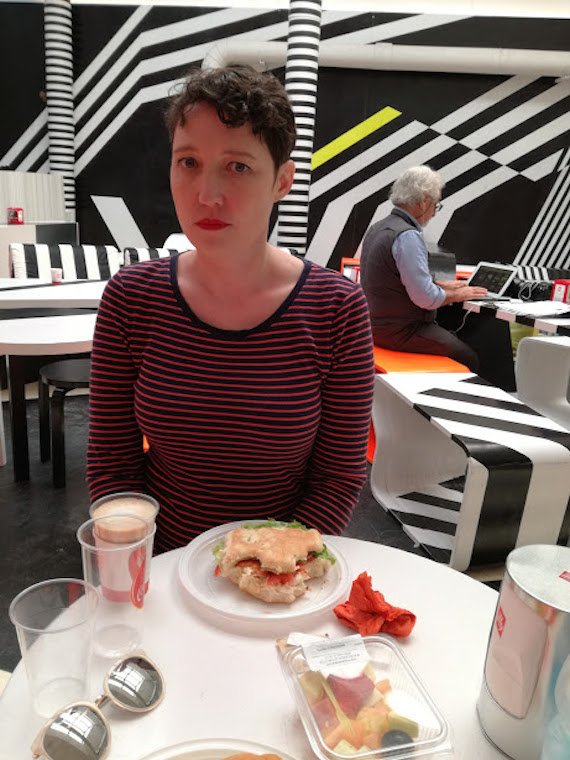
Stripes on stripes at the Venice Biennale canteen.
But the Venice Biennale isn’t short on glamour. Here is Cecilia Matteucci Lavarini, art and fashion collector, today in gold.
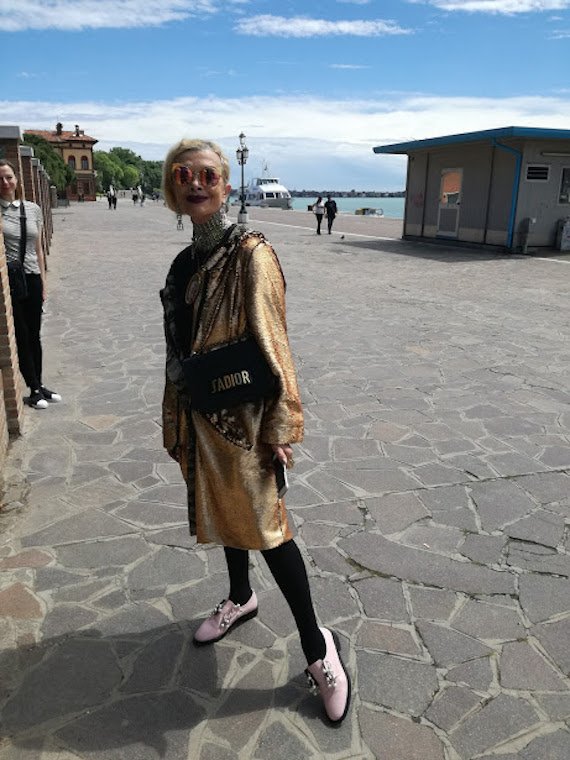
Cecilia, outside the Venice Biennale
Here is performance artist Orlan, rather impatient with me for not recognizing her.
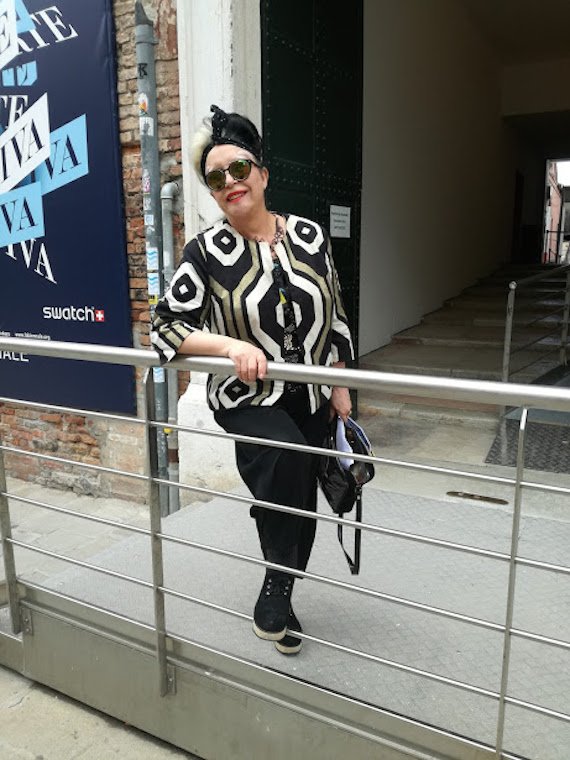
Orlan, before her performance at the Venice Biennale
This is the beautiful Lindsay, coordinating perfectly with the work of Russian artist Irina Korina:
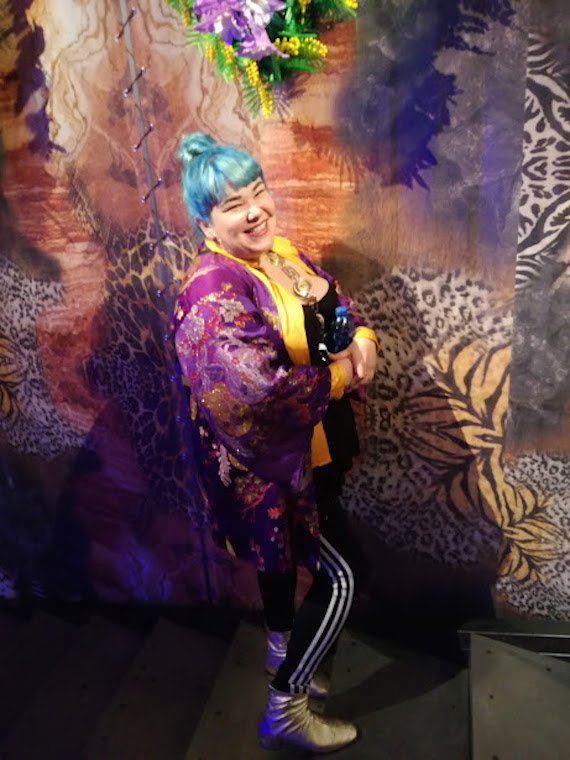
Lindsay
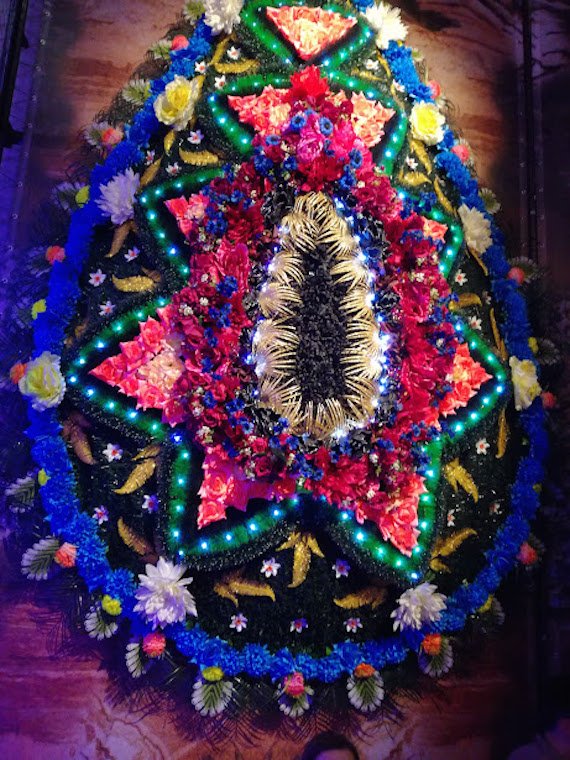
Detail of Irina Korina’s environment Good Intentions
And this is Lou, and I’m really sorry my snap didn’t capture her outfit well. Her pretty shiny dress looked perfect over a severe black polo neck and black tights, with just the brown leather jacket and a gold necklace a note of relief.
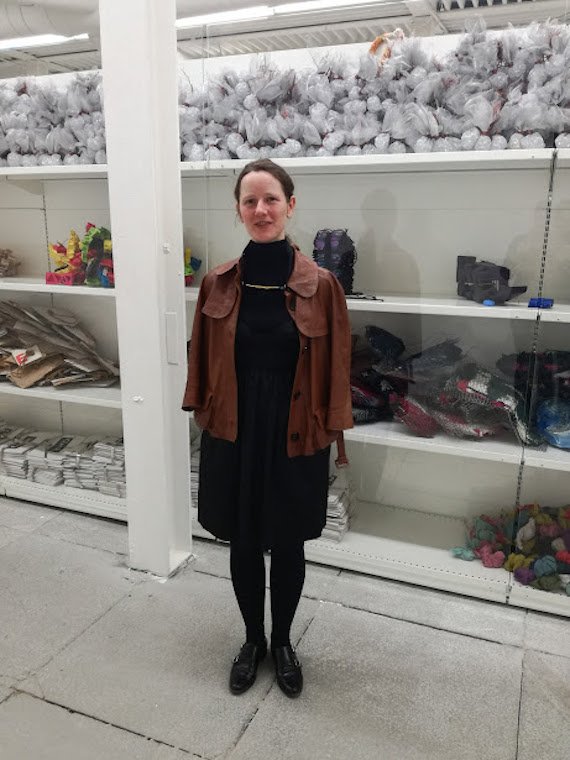
Lou
This is the most elegant Claudia, subverting her exquisite grey silk jacquard suit with lavish lavender satin scarf, tied just so, by misbuttoning it. Her jewelled trainers provide the perfect finishing touch.
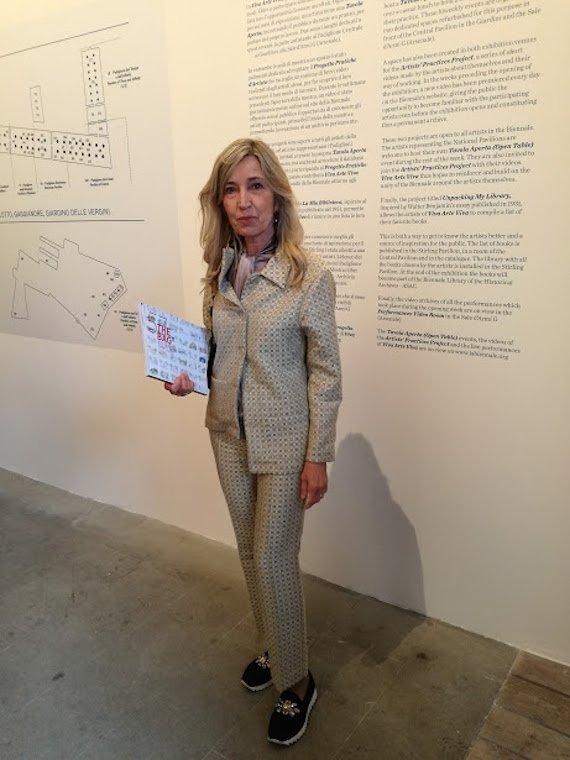
Claudia
Another note of elegance: Alexander Lazar again with a white suit jacquarded with tiny gold flowers, the cropped trousers emphasised by her white adidas.
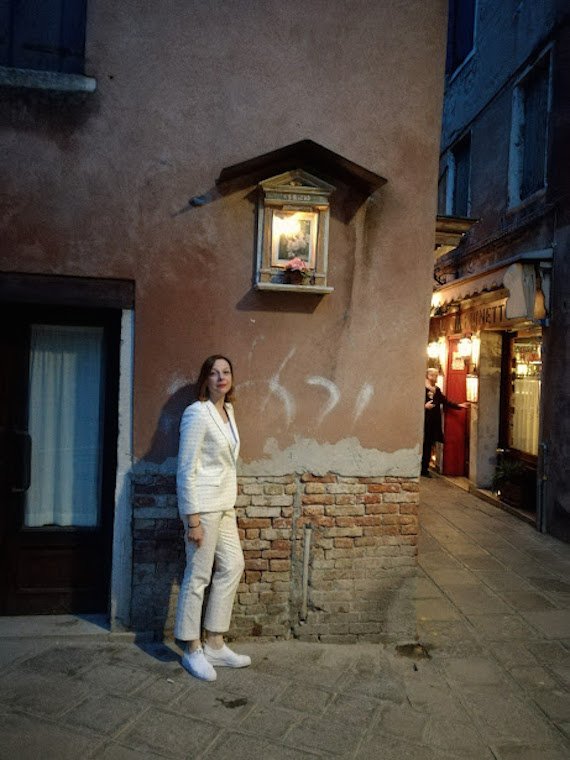
Alexandra Lazar
And here she is again in a joyous blue checked suit:
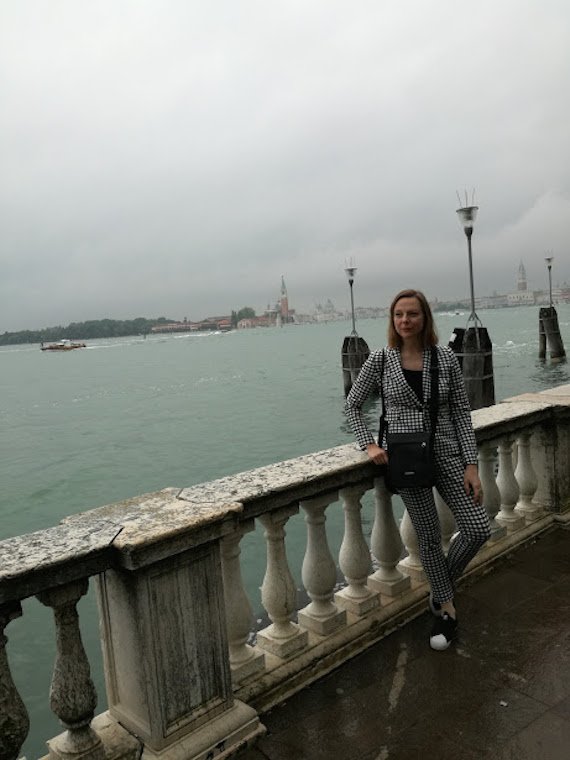
Alexandra Lazar
The perfect way to wear a hat:
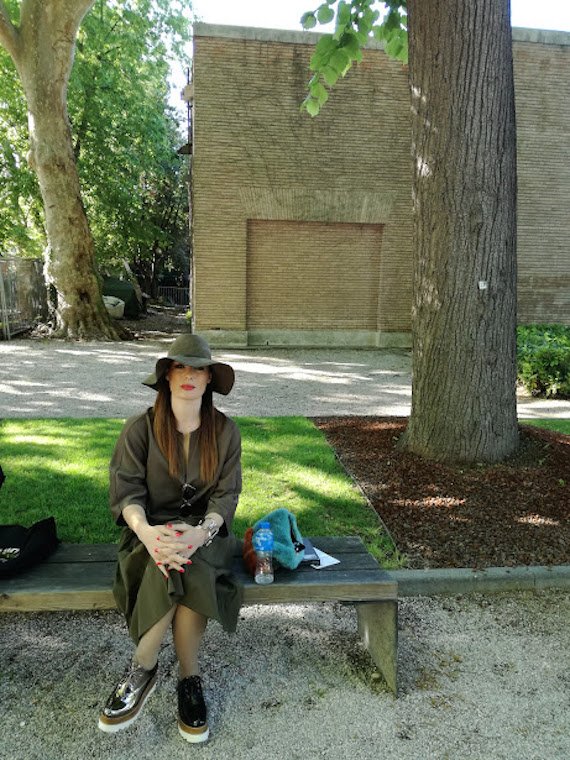
Serena
The perfectly languid couple, David and Caroline:
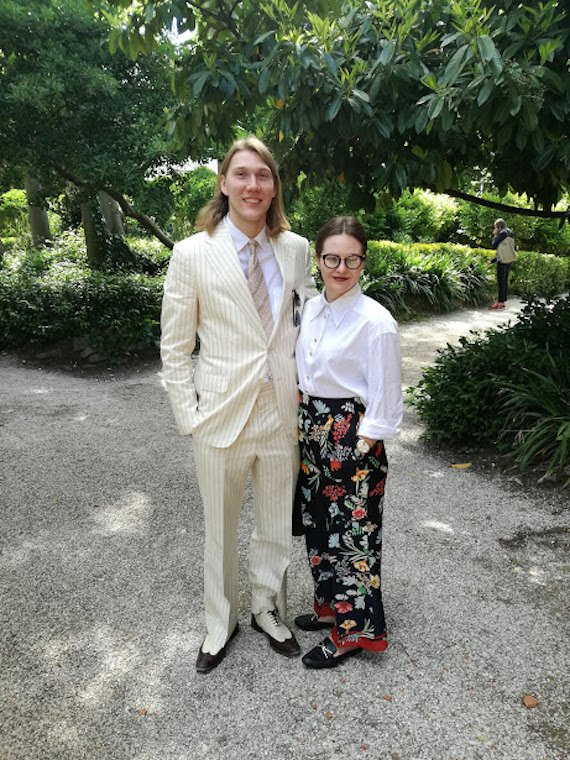
Elegant couple
Elegant in monotones:
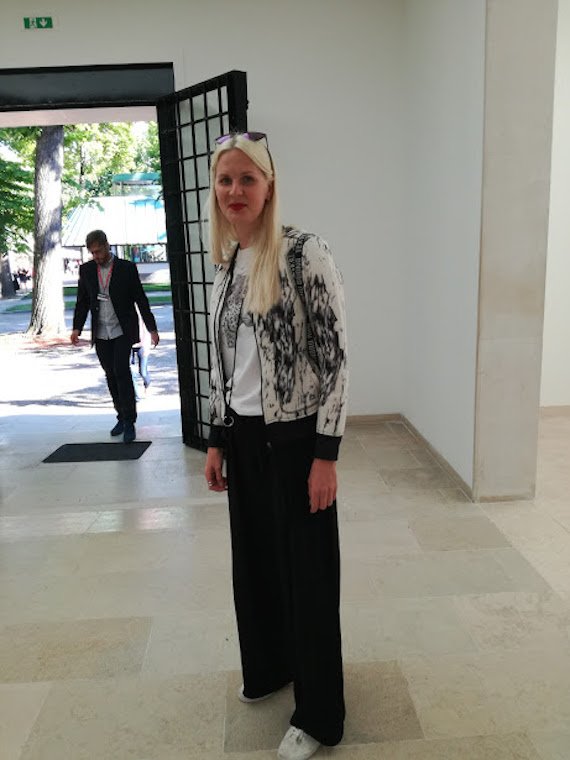
Maria
Venice Biennale – The Parties!
And at the party thrown by Drina Gallery in honour of Serbia’s pavillion:
Biljana Milenkovic in a unique, kimono like dress.
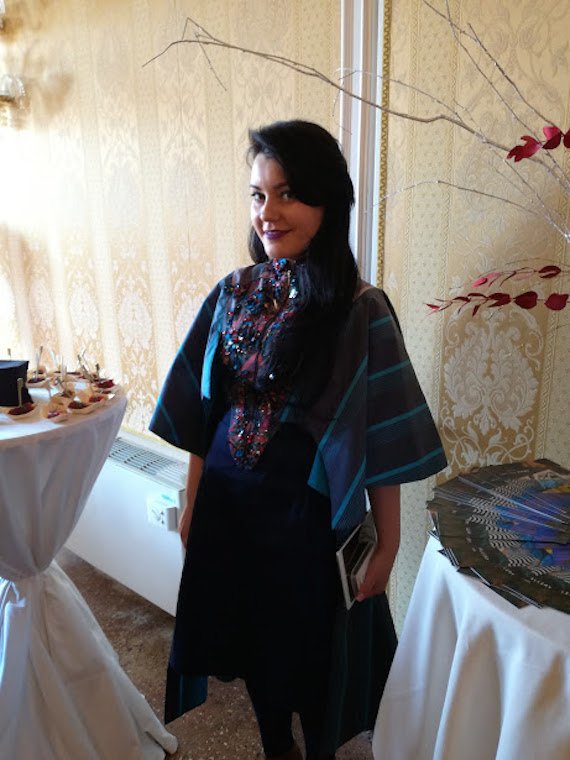
Biljana Milenkovic
The artist Gala Caki
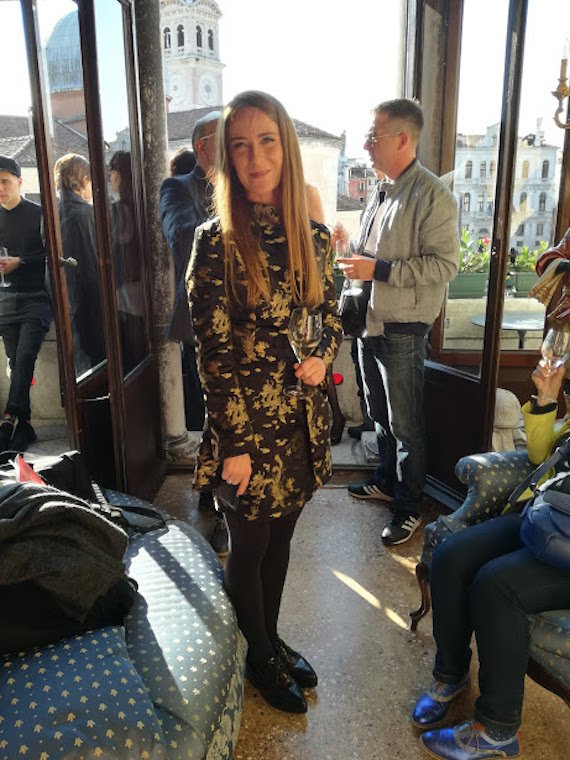
Gala Caki
I apologize, but I lost the name of the beautiful woman in a dress by Serbian designer Marko Mitanovski:
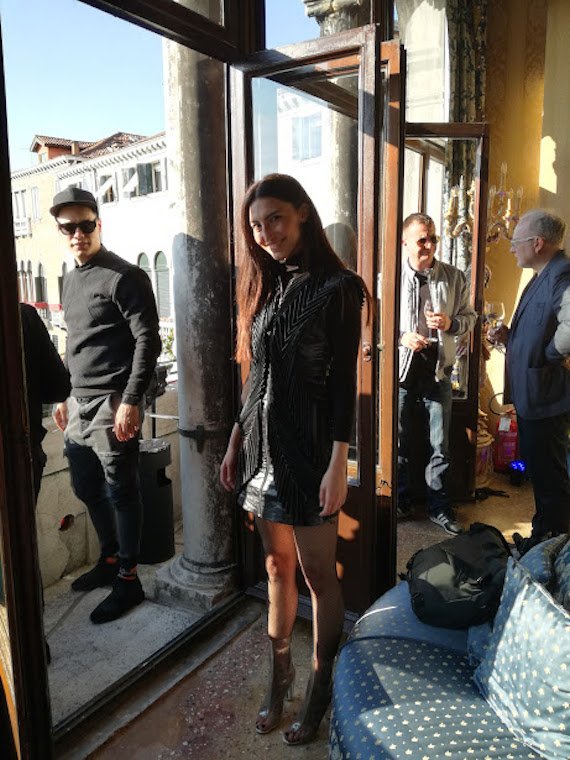
Dress by Marko Mitanovski
Jelena with her outfit perfectly matching the brocaded chairs,

Jelena
Gerard:
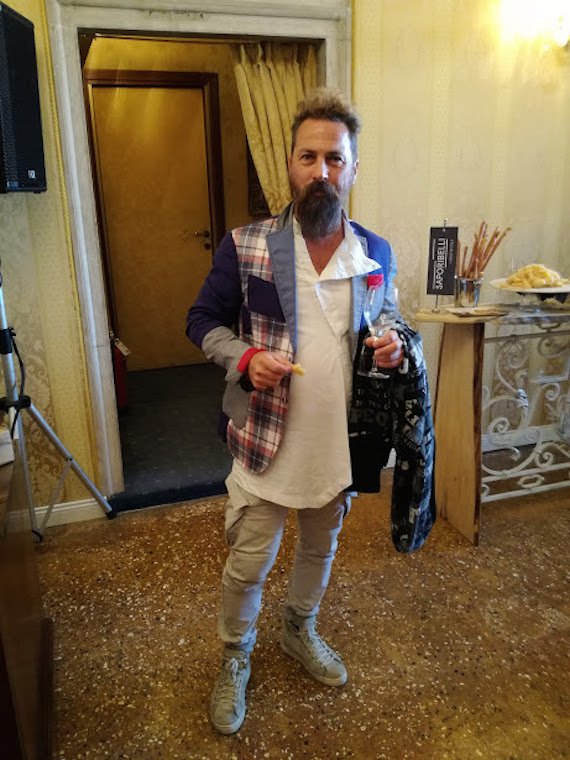
Gerard
The ultimate rock n roll couple, Nikola and Jelena:
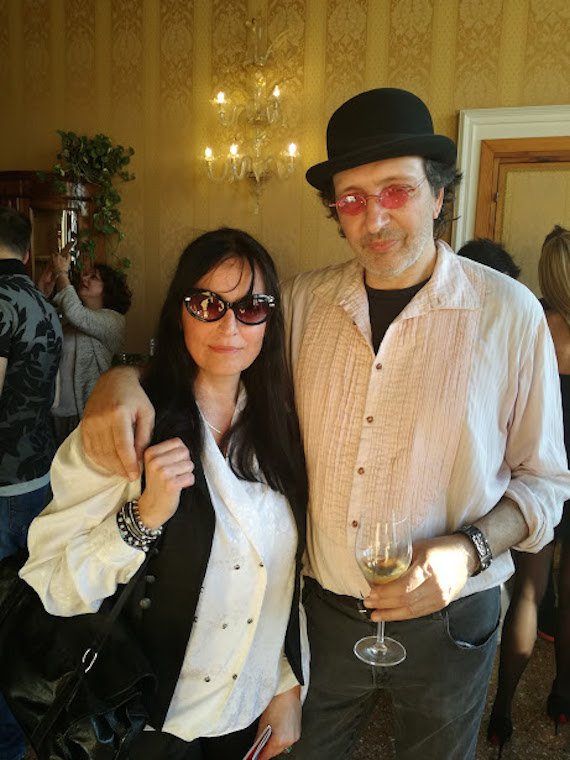
Nikola Zigon and Jelena Krsic
Danielle Kvaran in Issey Miyake
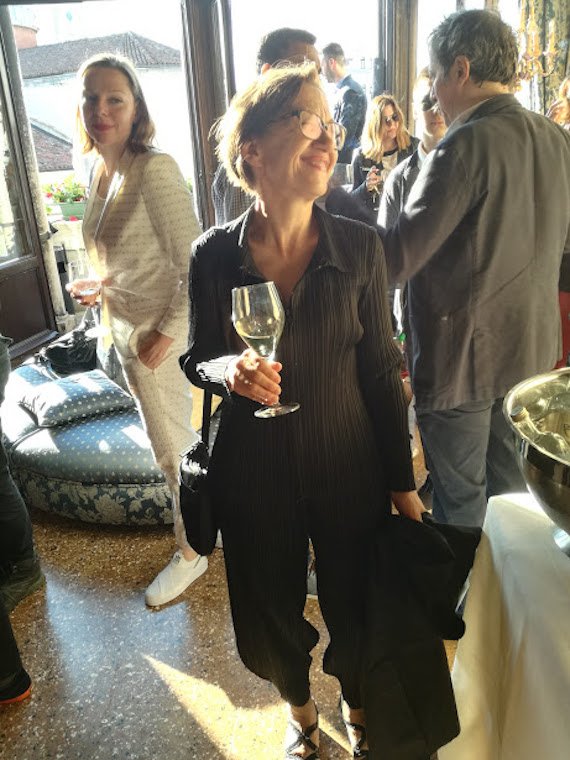
Danielle Kvaran in Issey Miyake.
And finally, myself, very happy at the end of a great night! My dress was made with vintage fabric from the 1940s, a beautiful tea rose silk.
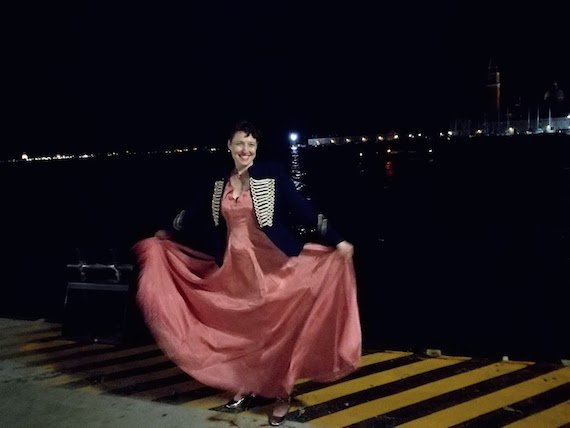
Genevieve Jones


